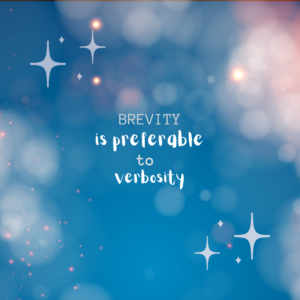
Overwriting.
Over-explaining.
Over-doing.
Over-extra-ing.
Whatever project you have going on in your life right now, take a step back from it and ask yourself if you’ve done too much?
But wait.
Aren’t we supposed to go the extra mile?
That’s not exactly what I mean.
If you’re painting a picture, do you have so much going on that it’s beginning to look like the illustrations in Richard Scarry’s Busy, Busy books?
And is that a bad thing? (It worked for Richard Scarry, after all.)
If you’re throwing a pot on a wheel, do you risk implosion by trying to add one more centimeter in height or width. (I don’t know the risks. I’m not a potter—forgive me.)
If you’re thanking someone for a gift, do you go overboard in your thank you note to the point where you’ve lost all credibility?
And if you’re a writer, do you beat your reader over the head with a story theme, doubling down on it on page one, two, seven, ten, etc.?
When do you stop?
How can you be sure the details you’re adding are really needed?
As I said, I don’t know about throwing pots, but I do know when a thank you note sounds too gushy.
As for art, I only know what I like, which is lots of details because it gives my eye something new to find every time I look.
But too many details in a painting, I suppose, might make it look like a Where’s Waldo illustration.
Let me scurry back to my corner and talk about writing.
As a writer, I know I tend to beat readers over the head with too much. (SOMETIMES! NOT ALWAYS, MS. or MR. AGENT!)
I just had a middle-grade story of mine critiqued by one of my writing groups, and one of the women crossed out several lines.
She didn’t say why.
She didn’t need to.
I was overwriting.
Her deletions were her way of saying, “We get it already, move on!”
Point taken.
Hand slapped.
Writers don’t need to overcomplicate things.
It’s like trying to explain a joke.
If you have to do that, then the joke isn’t very good.
But we do need to make sense.
So how much is too much?
Like most things, it’s a delicate balance.
My advice to myself—and to other writers—is to take a critical look at your story, email, letter.
If you have a detail that you find yourself explaining again and again, get out your red pen and cross right through those repetitions.
Give your readers credit that they’re smart enough to figure out what you’re saying without beating them over the head.

Brevity is preferable to verbosity. (BTW: This post is under 500 words. Look at me being brief.)
Until next week,
~ Gail
Countdown: 30 more weeks of 2024
Before you go, don’t forget to sign up for my mailing list, below:






Gail,
Great advice!
Thank you, Sherry!
Wow, Kelly, That’s an impressive family history. I would think that WTHRFG is a classic, and, you’re right, it deserves a renaissance. I don’t think my kids had to read it in school. Now I’m going to reread it. It’s great to hear from you. I’m glad to know that you’re working on some fiction of your own. If you need an early reader, send it my way!